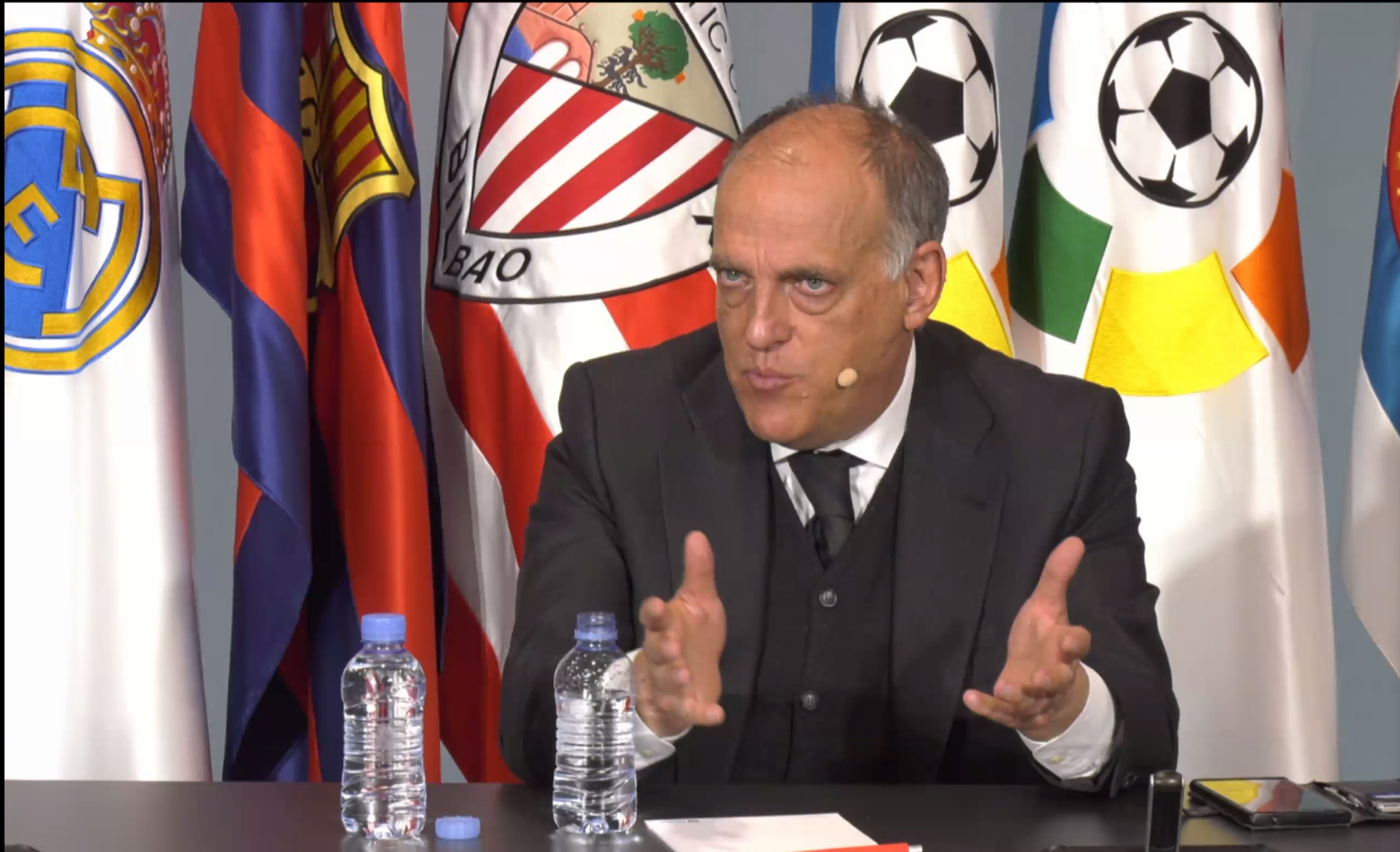By Paul Nicholson
April 22 – Spain’s Laliga, and its clubs, are keeping their foot firmly on the pedal of opposition to the now fractured European Super League. With its two biggest clubs – Real Madrid and Barcelona – belligerent in their belief that the ESL is the way forward, the league’s clubs issued a statement rejecting the format, followed by a press conference that forcefully emphasised their unity in opposition.
Led by Laliga CEO Javier Tebas (pictured), with the back up of the presidents of Sevilla, Levante, Villareal, Valencia and Real Betis, the condemnation of the Super League clubs and in particular of Real Madrid president Florentino Perez was unequivocal.
Top of the list of complaints was that the fundamental principle of a league not based merit is unacceptable. Real Betis president Ángel Haro said that “competing in European competitions is a dream. We hope to be part of all these competitions.” Levante president Francisco Catalan said that the ESL “destroys a defined business model that everyone knows and is a successful model… It destroys the principle of solidarity.” Villareal’s veteran president Fernando Roig similarly echoed his colleagues saying that “fans dream of the Champions League…we aspire for the very top, all our fans do, we dream. This project would restrict our dreams.”
As usual there was no misunderstanding of Tebas or his opposition to the ESL, pointing out that what has “happened in the past is not like now as they hadn’t set up a company…the ECA voted in favour of the Champions League reform, on Friday they were at the meeting and approved the reform and on Sunday they issued the press release.”
The sense of duplicity towards the breakaway clubs by their domestic league colleagues was unequivocal. But on the question of sanctions, Tebas was more reserved, pointing that all clubs have to sign up to next season’s European competition rules in May.
“I am not talking about sanctions. Everyone wants to cut someone’s head off. I am not talking about this,” said Tebas. “If they continue with the project we will see what we have to do…The clubs have been sanctioned by their own fans and all the other clubs…Their reputations have been affected.”
Returning to the issues of sanctions later in the press conference, Tebas said of the Spanish rebel clubs that “to be in our league they have to respect our competition. Rather than sanctions we are looking for protective measures for the future.”
Acknowledging that this might not be the end of Super League proposals Tebas was quick to point out that “the six English clubs will never be in that sort of competition. The Germans will never take part… Obviously we have to reform certain things so now they can’t put pressure.”
“Super League is dead without English and German teams. Be realistic, it is dead,” said Tebas.
On Real Madrid president Florentino Perez’s comments that the Super League was going to save football, Tebas was equally dismissive. “If this Super League is going to help football. If you think that you made a mistake. Either you made a mistake or you are lying.
“Spanish football is not going to go bankrupt. We will continue with our financial control and increase the value of our rights,” said Tebas.
“Spanish football has not asked for state aid. We have paid our taxes. We have paid our players. We don’t have the catastrophe that Florentino talks about.”
With any talk of Super League the dark spectre of FIFA and the club league ambitions of its president Gianni Infantino are, these days, the elephant in the room of any debate.
Tebas questioned the role and position of Infantino, pointing out that FIFA’s first press release was weak but that his speech to the UEFA congress was considerably firmer – Infantino came down on the right side of the dispute, just.
“It is not what he actually says,” said Tebas, “I would like him to speak more clearly on what he thinks and means to do about all this.”
The subtext here is that Infantino has encouraged Perez in the past to lead the charge on a global grouping of clubs, and of course he has his own (currently partly thwarted) ambitions for a FIFA Club World Cup to be the pinnacle of the club game, unlike its generally unwanted and painfully manufactured club competition.
One gets the feeling that while the Spanish know the latest battle has been won, the war could yet be far from over. But, as far as they can see, all the terrorists have now broken cover and their weapons of mass destruction clearly identified.
Contact the writer of this story at moc.l1745956512labto1745956512ofdlr1745956512owedi1745956512sni@n1745956512osloh1745956512cin.l1745956512uap1745956512

